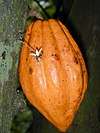Dark chocolate
Dark chocolate (also known as black chocolate[1], plain chocolate,[2] or bitter chocolate[3]) is a form of chocolate which contains a higher percentage of cocoa solids and cocoa butter than milk chocolate, and little to no dairy product. Government and industry standards of what products may be labeled "dark chocolate" vary by country and market.[4]
Dark chocolate contains antioxidants, such as polyphenols, and is relatively low in sugar. It has a reputation as a healthier alternative to other types of chocolate, such as milk chocolate.[5][6] Dark chocolate has been identified as a potential "superfood".[7] This has helped lead to a global increase in demand for dark chocolate.[8]
Health benefits
Most dark chocolates that have over 70% cocoa on the market today contain a series of chemicals that interact with cell and tissue components that help protect against the development and effects of certain diseases and illnesses.[9] In cocoa and cocoa products the flavanols that are responsible for the health benefits are referred to as: monomers, epicatechin, and catechin.[9]
When consuming high levels of cocoa, evidence shows that flavanols have proven to help lower blood pressure and cholesterol, improve mental cognition, and has also been shown to potentially lower the risk of diabetes in some people.[10]
Diets that are rich in antioxidants including foods such as cocoa, fruits and vegetables promote better health. They even show signs of potentially delaying the onset of various diseases, including cardiovascular disease (CVD), diabetes, certain cancers, and several other age-related degenerative disorders.[9]
Nutritional content
| Nutritional value per 100 g (3.5 oz) | |
|---|---|
| Energy | 2,708.42 kJ (647.33 kcal) |
|
45.90 g | |
| Sugars | 23.99 g |
| Dietary fiber | 10.9 g |
|
42.63 g | |
| Saturated | 24.489 g |
| Trans | 0.030 g |
| Monounsaturated | 12.781 g |
| Polyunsaturated | 1.257 g |
|
7.79 g | |
| Vitamins | Quantity %DV† |
| Vitamin A equiv. |
0% 2 μg |
| Vitamin A | 39 IU |
| Thiamine (B1) |
3% 0.034 mg |
| Riboflavin (B2) |
7% 0.078 mg |
| Niacin (B3) |
7% 1.076 mg |
| Vitamin B6 |
29% 0.38 mg |
| Vitamin E |
4% 0.59 mg |
| Vitamin K |
7% 7.3 μg |
| Minerals | Quantity %DV† |
| Calcium |
7% 73 mg |
| Iron |
92% 11.90 mg |
| Magnesium |
64% 228 mg |
| Phosphorus |
44% 308 mg |
| Potassium |
15% 715 mg |
| Sodium |
1% 20 mg |
| Zinc |
35% 3.31 mg |
| Other constituents | Quantity |
| Water | 1.37 g |
| Caffeine | 80 mg |
| Cholesterol | 3 mg |
|
| |
| |
|
†Percentages are roughly approximated using US recommendations for adults. Source: USDA Nutrient Database | |
See also
References
| Wikimedia Commons has media related to Dark chocolate. |
- ↑ "Dark Chocolate Side Effects". Med-Health.net.
- ↑ "Bittersweet Chocolate". nigella.com. 4 July 2012. Archived from the original on 29 September 2016. Retrieved 29 September 2016.
Dark or plain chocolate is chocolate made with cocoa solids, sugar and cocoa butter (or vegetable oils in cheaper chocolates).
- ↑ https://dictionary.cambridge.org/dictionary/english/bitter-chocolate
- ↑ "What is dark chocolate?". Baking Bites. 26 May 2011. Retrieved 14 December 2017.
- ↑ "Dark Chocolate Is Healthy Chocolate". WebMD. Retrieved 15 March 2016.
- ↑ "Heart-Health Benefits of Chocolate Unveiled". Retrieved 15 March 2016.
- ↑ "Is Chocolate the Next Super Food?". WebMD. Retrieved 15 March 2016.
- ↑ "Preference for dark chocolate continues". Archived from the original on 6 January 2014. Retrieved 15 March 2016.
- 1 2 3 Galleano, Monica (1 December 2010). "Cocoa, chocolate and cardiovascular disease". J Cardiovasc Pharmacol. doi:10.1097/FJC.0b013e3181b76787. PMC 2797556.
- ↑ Drayer, Lisa. "Is dark chocolate healthy?". www.cnn.com.

